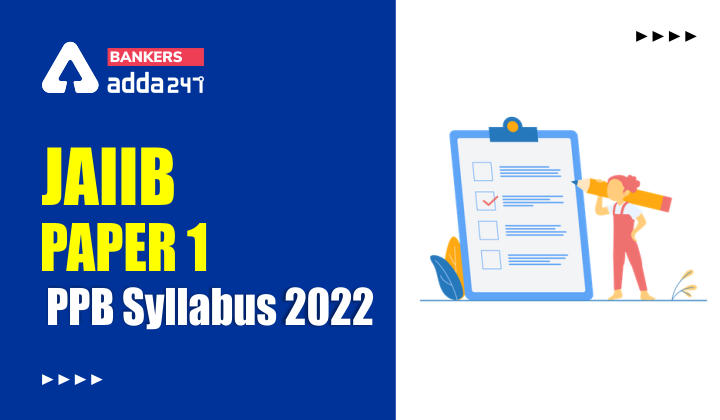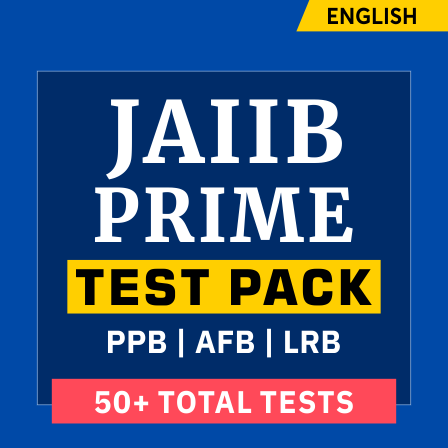Table of Contents
JAIIB Paper 1 Syllabus 2022: JAIIB Syllabus 2022 is the backbone of the JAIIB Exam 2022 because the syllabus provides a clear understanding and clarity of the Exam. JAIIB Syllabus is vast and is one of the most important factors with which a candidate needs to be thorough enough to understand the exam preparation process. The Indian Institute of Banking and Finance(IIBF) lay down the JAIIB Exam pattern and syllabus. To prepare in a strategic manner aspirants should be well aware with the latest exam patter and JAIIB Syllabus 2022. For the sake of aspirants we have provided the JAIIB Syllabus 2022 in a comprehensive manner.
JAIIB Paper 1 Syllabus 2022 Topic wise Paper 1 Syllabus & Preparation Tips
There will be 3 papers in the JAIIB Examination 2022 going to be conducted on 11th,12th, and 19th June 2022. Each paper of JAIIB is divided into different modules. A candidate needs to cover all three paper and their different modules to clear the JAIIB Exam 2022. The detailed exam pattern for JAIIB exam 2022 is given in the table below:
| Subjects | No. of Questions | Total Marks | Duration |
| Principles and Practices of Banking | 120 | 100 | 2 hours |
| Accounting and Finance for Bankers | 120 | 100 | 2 hours |
| Legal and Regulatory Aspects of Banking | 120 | 100 | 2 hours |
In the article below we have discussed the JAIIB paper 1 syllabus 2022 in a detailed manner.
JAIIB Paper 1 Syllabus 2022 Check in Hindi
JAIIB Paper 1 Syllabus: Principles and Practices of Banking
Paper-1 of JAIIB Exam 2022 is Principles and Practices of Banking which is further divided into five modules. A candidate should be familiar with all the topics of the five modules so that paper 1 becomes the most scored subject in the JAIIB Exam 2022. Different modules of JAIIB Paper 1 along with their topics are discussed below.
Module A: Indian Financial System
First Module of the JAIIB Paper 1 Syllabus is The Indian Financial System. In the table below the units and their respective topics are given:
| Name of the Unit | Topics |
| Indian Financial System – Overview | Role of RBI, Commercial Banks, NBFCs, PDs, FIs, Cooperative Banks, CRR, SLR; Equity & Debt Market; IRDA |
| Banking Regulation | Constitution, Objectives, Functions of RBI; Tools of Monetary Control; Regulatory Restrictions on Lending |
| Role of Money Markets, Debt Market and Forex Market | Types of Money & Debt Market Instruments incl. G-Secs; ADs, FEMA, LIBOR, MIBOR, etc. |
| Role & Functions of Capital Markets, SEBI | Overview of Capital Market; Stock Exchange; Commonly used Terms; Types of Capital Issues; Financial Products/ Instruments including ASBA, QIP; SEBI; Registration of Stock Brokers, Sub brokers, Share Transfer Agents, etc. QIBs |
| Mutual Funds & Insurance Companies, Bancassurance & IRDA | Types of Mutual Funds, its Management & its Role; Role & Functions of Insurance Companies Bancassurance; IRDA |
| Factoring, Forfaiting Services and Off-Balance Sheet items | Types & advantages of Factoring & forfeiting services; Types of off-balance sheet items |
| Risk Management, Basel Accords | Introduction to Risk Management; Basel I, II & III Accords |
| CIBIL, Fair Practices Code for Debt collection, BCSBI | Role and Functions of CIBIL; Fair Practices Code for Debt Collection; Codes of BCSBI |
| Recent Developments in the Financial System | Structure, Reforms in the Indian Financial System; recent developments in Money, Debt, Forex Markets; Regulatory Framework; Payments and Settlement System |
Module B: Functions of Banks
Module B deals with the function of banks. The units and topics of functions of Banks are summarized in the table below.
| Name of the Unit | Topics |
| Banker Customer Relationship | Types; Different Deposit Products & Services; Services to Customers & Investors |
| KYC/ AML / CFT norms | PMLA Act; KYC Norms |
| Bankers’ Special Relationship | Mandate; POA; Garnishee Orders; Banker’s Lien; Right of Set-off |
| Consumer Protection – COPRA, Banking Ombudsman Scheme | Operational Aspects of COPRA Act & Banking Ombudsman Scheme |
| Priority Sector Advances | Targets; Sub-Targets; Recent Developments |
| Agricultural Finance | Types of Agricultural Loans; Risk Mitigation in agriculture (NAIS, MSP etc. ) |
| Micro, Small and Medium Enterprises | MSMED Act, 2006 Policy Package for MSMEs; Performance and Credit Rating Scheme; Latest Developments |
| Government Sponsored Schemes | SGSY; SJSRY; PMRY; SLRS |
| Payment and Collection of Cheques and Other Negotiable Instruments | NI Act; Role & Duties of Paying & Collecting Banks; Endorsements; Forged Instruments; Bouncing of Cheques; Its Implications; Return of Cheques; Cheque Truncation System |
| Opening accounts of various types of customers | Operational Aspects of opening and Maintaining Accounts of Different Types of Customers including Aadhar, SB Rate Deregulation |
| Ancillary Services | Remittances; Safe Deposit Lockers; Govt. Business; EBT |
| Cash Operations | Cash Management Services and its Importance |
| Principles of lending, Working Capital Assessment and Credit Monitoring | Cardinal Principles; Non-fund Based Limits; WC; Term Loans; Credit Appraisal Techniques; Sources of WC Funds & its Estimation; Operating Cycle; Projected Net WC; Turnover Method; Cash Budget; Credit Monitoring & Its Management; Base Rate |
| Self Help Groups | Need for & Functions of SHGs; Role of NGOs in Indirect Finance to SHGs; SHGs & SGSY Scheme; Capacity Building |
| Credit Cards, Home Loans, Personal Loans, Consumer Loans | Operational Aspects, Advantages, Disadvantages & Guidelines of Credit Cards; Procedure and Practices for Home Loans, Personal Loans and Consumer Loans |
| Documentation | Types of Documents; Procedure; Stamping; Securitization |
| Different Modes of Charging Securities | Assignment; Lien; Set-off; Hypothecation; Pledge; Mortgage |
| Types of collaterals and their characteristics | Land & Buildings; Goods; Documents of Title to Goods; Advances against Insurance Policies, Shares, Book Debts, Term Deposits, Gold, etc.; Supply Bills |
| Non Performing Assets | Definition; Income Recognition; Asset Classification; Provisioning Norms; CDR |
| Financial Inclusion | BC; BF; Role of ICT in Financial Inclusion, Mobile based transactions, R SETI |
| Financial Literacy | Importance of financial literacy, customer awareness |
Module C: Banking Technology
Banking Technology is the third module of the JAIIB Paper 1 syllabus which mainly consists of topics related to technology in banking.
| Name of the Unit | Topics |
| Essentials of Bank Computerization | Computer Systems; LANs; WANs; UPS; Core Banking |
| Payment Systems and Electronic Banking | ATMs; HWAK; PIN; Electromagnetic Cards; Electronic Banking; Signature Storage & Retrieval System; CTS; Note & Coin Counting Machines; Microfiche; NPC; RUPAY |
| Data Communication Network and EFT systems | Components & Modes of Transmission; Major Networks in India; Emerging Trends in Communication Networks for Banking; Evolution of EFT System; SWIFT; Automated Clearing Systems; Funds Transfer Systems; Recent Developments in India |
| Role of Technology Upgradation and its impact on Banks | Trends in Technology Developments; Role & Uses of Technology Upgradation; Global Trends; Impact of IT on Banks |
| Security Considerations | Risk Concern Areas; Types of Threats; Control Mechanism; Computer Audit; IS Security; IS Audit; Evaluation Requirements |
| Overview of IT Act | Gopala Krishna Committee Recommendations |
| Preventive Vigilance in Electronic Banking | Phishing; Customer Education; Safety Checks; Precautions |
Module D: Support Services Marketing of Banking Services/Products
The units and topics involved in Module D are discussed in the table below:
| Name of the Unit | Topics |
| Marketing – An Introduction | Concept; Management; Products & Services; Marketing Mix; Brand Image |
| Social Marketing/ Networking | Evolution, Importance & Relevance of Social Marketing/ Networking |
| Consumer Behavior and Product | Consumer Behavior; Product Planning, Development, Strategies, etc.; CRM |
| Pricing | Importance, Objectives, Factors, Methods, Strategies of Pricing; Bank Pricing |
| Distribution | Distribution Channels; Channels for Banking Services; Net Banking; Mobile Banking |
| Channel Management | Meaning, Levels, Dynamics, Advantages |
| Promotion | Role of Promotion in Marketing; Promotion Mix |
| Role of Direct Selling Agent/ Direct Marketing Agent in a bank | Definition; Relevance; Banker as DSA/ DMA; Delivery Channels in Banks; Benefits |
| Marketing Information Systems – a longitudinal analysis | Functions & Components of MKIS; MKIS Model; Use of Computers & Decision Models; Performance of MKIS; Advantages |
Module E: Ethics in Bank and Financial Institutions
Ethics is a necessary thing in banks and Financial Institutions. The fifth module of the Principles and Practices of Banking is related to ethics.
| Name of the Unit | Topics |
| Ethics, Business Ethics & Banking: An integrated Perspective | Business Ethics, Ethical Foundation and Banking Ethics in Global and Indian Contexts |
| Ethics at the Individual Level | Values, Norms, Beliefs, Morality, Conflict, Integrity, Golden Rule, Dilemmas, Decision-Making |
| Ethical Dimensions: Employees | Obligation to Bank/ Third Parties, Abuse of Official Position, Sexual Harassment, Conflict of Interest, Fair Accounting Practices, HRM Ethics, Employees as Ethics Ambassadors & Managers as Ethical Leaders |
| Work Ethics and the Workplace | Work Ethics, Benefits of Ethical Behavior, Unethical Behavior: Causes and Remedies, Code of Ethics Manual, Whistleblowing in Banks, Whistleblowing Laws in India |
| Banking Ethics: Changing Dynamics | Ethics and Technology, Data Security and Privacy, Intellectual Property Rights, Patents and Proprietary Rights, Ethics of Information Security, Cyber Threats, Digital Rights Management |
JAIIB Exam Related Links:
| JAIIB Admit Card 2022 | Strategy to crack JAIIB Exam 2022 |
| JAIIB Syllabus 2022 | JAIIB June Exam Date 2022 |
FAQs: JAIIB Paper 1 Syllabus 2022
Q1. How many papers are there in the JAIIB Exam 2022?
Ans. There are 3 papers in the JAIIB Exam 2022.
Q2. How many modules are there in JAIIB Paper 1 Syllabus 2022?
Ans. There are 5 modules in JAIIB Paper 1 Syllabus 2022.




 The Hindu Review October 2022: Download ...
The Hindu Review October 2022: Download ...
 Daily Current Affairs 19th April 2024, I...
Daily Current Affairs 19th April 2024, I...
 LIC ADO Score Card 2024 Out, Check ADO M...
LIC ADO Score Card 2024 Out, Check ADO M...



